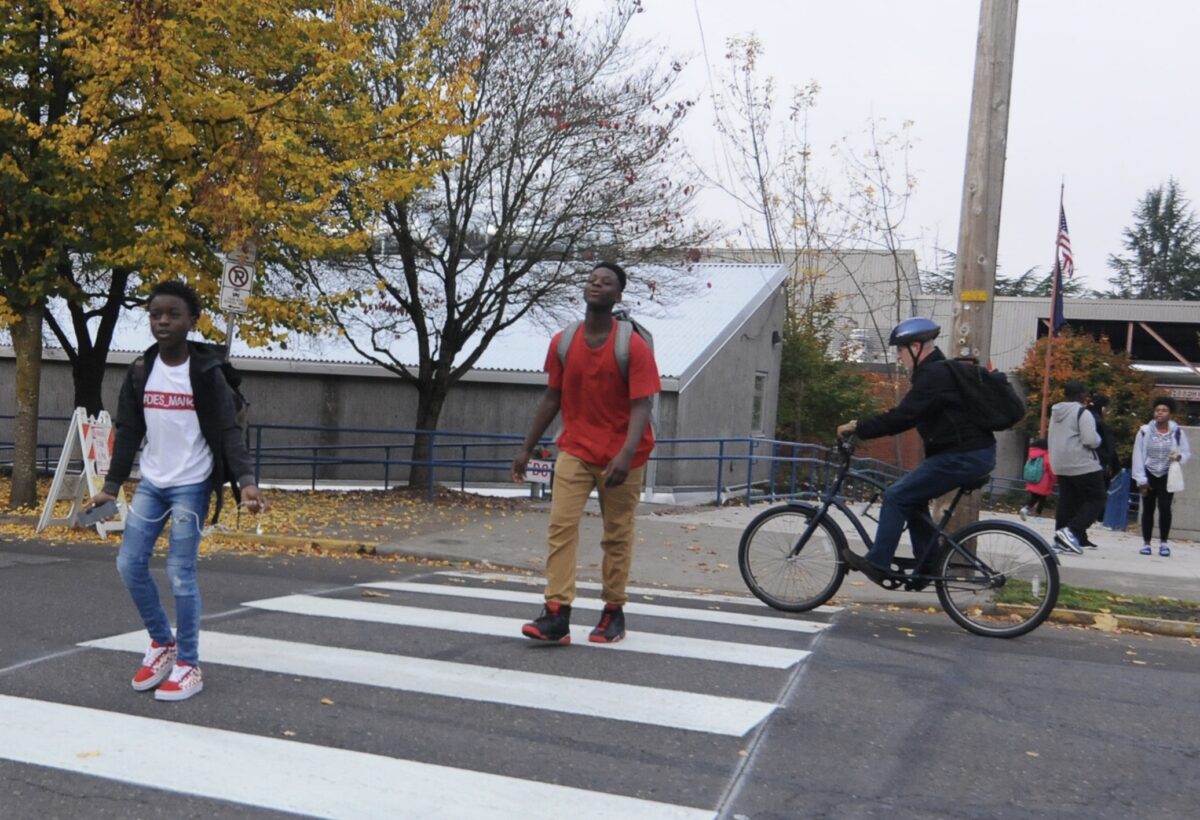
(Photo © J. Maus/BikePortland)
As Metro rumbles toward a ballot measure to raise billions of dollars for transportation projects and programs next year, polling released today shows that potential voters are ready to help pay for it.
Metro Director of Government Affairs Andy Shaw sounded pleased with the poll results during a phone interview today. “I think this is a positive result that says if we bring the right kinds of investments and outcomes in the measure, there’s a pathway to ask the voters to pay for it.”
A phone poll conducted by FM3 Research on the first week of December found solid support for a mix of new taxes and fees. Metro asked nearly 1,000 would-be voters from across the region about three combinations of potential revenue sources that included: a $50 per year vehicle registration fee, a 40-cent per $1,000 of assessed value property tax increase; a six-tenths of a percent payroll tax on businesses, and a 1% income tax increase on households that make over $100,000 per year.
The most popular option was a combination of vehicle registration fee, payroll tax and income tax that 56% of poll respondents gave some level of support to. The least popular option that included a mix of the registration fee, payroll tax, and property tax scored the lowest level of support with just 43% saying they’d be likely to vote for it. Taken by themselves, the most popular mechanism was a corporate business tax with a 59% favorability rating. The least popular was an increase in property taxes which only 31% of respondents found acceptable. (The poll has a margin of sampling error of ±3.3% and a 95% confidence interval.)
The poll released today is a follow-up to one released in October that led to headlines that voters wanted to keep widening roads.
Advertisement
With any poll, how the questions are asked can make a big difference. Shaw said Metro staff worked with the polling company and vetted the questions with groups like Getting There Together Coalition.
Here’s how they defined the measure:
“The measure would be designed to reduce traffic; create additional transportation choices for residents; reduce the pollution that causes climate change; and make earthquake safety upgrades to bridges and roads. It would fund repairs to local streets and roads; new MAX light rail and rapid bus lines; and improvements to make streets and intersections safer and make it faster for buses to move through traffic. It would raise billions of dollars over 20 years, and funding for the measure would come from…”
In addition to asking people where the money should come from, the poll asked several other questions that could influence how the package is put together.
Advertisement
Asked why they’d vote yes (487 people) or no (437 people), more supporters mentioned the need for better transit in an open-ended response than any other reason. People who voted no mentioned a distrust of government and some form of “too many new taxes” as their reason.
When asked about different types of projects were important to fund, the answers showed that 69% of respondents feel, “Improving pedestrian and overall safety on streets and roads with a history of crashes, and near senior centers, schools, and places where a lot of people walk,” is extremely, very or somewhat important. By comparison, “Making it easier and faster for businesses to deliver products throughout greater Portland,” came in at just 24% and “improvements to major intersections to ease the flow of traffic,” earned 61% favorable ratings.
As for how much the households would be willing to pay for transportation investments, $100 per year received 64% support. That figure jumped to 71% at $50 a year and decreased to 51% at $200 per year.
Even with only slight favorable majorities on some of the key questions, Shaw sees the poll as a solid green light to keep moving forward on the ballot measure. “A poll like this is sort of like dinner,” he shared with me today. “When you think of your whole dinner, people have certain type of response; but when you just talk about vegetables, they might not have the same response. Here we’re talking about different kinds of vegetables, so you expect lower results.”
Advertisement
The challenge for Metro will be to make sure the package has a mix of projects and programs that a majority of voters can get behind. Unlike successful recent transportation funding measures in other west coast cities, our region is likely to include a package that includes a wide variety of projects. There are some vehemently opposed to any new spending on roads and driving capacity increases, while others won’t support a package unless it includes more roads and lanes because of the belief that they’re necessary and they work to reduce congestion.
It’s notable that while 85% of the poll takers said they mostly drive alone, ostensibly non-driver projects that would invest in things like bike lanes, safe crossings near schools, and faster buses, received strong support.
Read more about the potential funding mechanisms (PDF) and review the full poll results (PDF).
— Jonathan Maus: (503) 706-8804, @jonathan_maus on Twitter and jonathan@bikeportland.org
— Get our headlines delivered to your inbox.
— Support this independent community media outlet with a one-time contribution or monthly subscription.



